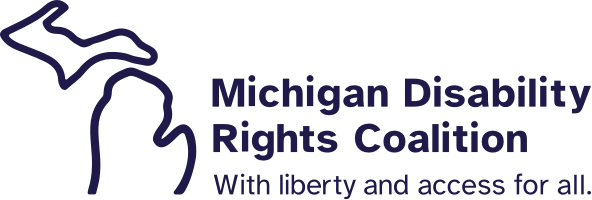Domestic Violence, Sexual Assault, and AT
Thursday, July 13, 2017
By Aimee Sterk, LMSW, MATP Staff
MDRC staff members have been working on a multi-year collaborative grant from the Office of Violence Against Women in the U.S. Department of Justice. Through that work, all of our staff has been learning about responding to, preventing, and connecting to the services and supports available, for people experiencing domestic violence/sexual assault.
People with disabilities experience sexual assault and domestic violence at a far higher rate than the general population and these violations can also lead to disability. As a community, we as people with disabilities need to be aware and active in both preventing domestic violence and sexual assault and in responding to it.
How does this all relate to assistive technology (AT)?
- Perpetrators may withhold people with disabilities’ access to needed assistive technology as a means of control.
- Perpetrators may monitor conversations of people with disabilities, especially people who are Deaf and use communication devices. This is another means of control.
- People with disabilities who experience domestic violence or sexual assault may need access to AT devices emergently as they move to shelters or other spaces for safety. Devices may be left behind and AT/additional personal attendants may be needed to deal with the fact that many times perpetrators are family members or caregivers who people with disabilities relied on for support. Loan closets of devices and the ATxchange website are potential resources for use of devices while sorting out living situations, accessing services and supports, and making safety plans.
- Many shelters are not accessible and need to develop ways to help people with disabilities access AT when they flee a situation.
- Sexual Assault and domestic violence program staff may not be aware, or capable of, assisting people with disabilities who have intellectual, processing, or communication disabilities due to their own lack of knowledge and skills. Access to assistive technology can help.
- Apps for PTSD can be useful to survivors of domestic violence and sexual abuse. For example, I am a sexual abuse survivor and use Gratitude! for mindfulness and PTSD Coach.
- There are apps and devices for safety like Circle of 6 which lets you send out messages to your friends like “come get me” and gives your GPS location. Circle of 6 also can connect you to resources.
- Survivors who are Deaf and hard of hearing need to know their rights and the systems of help available. Some communication and relay systems keep transcripts of conversations automatically unless the user specifically requests that they don’t. Perpetrators have also impersonated Deaf survivors through electronic communication methods so shelters and survivors may want to develop codes phrases.
Do you know about domestic violence and sexual assault services in your community? Are they accessible? Have they done an accessibility audit? Are they welcoming and able to serve people with all types of disabilities?

